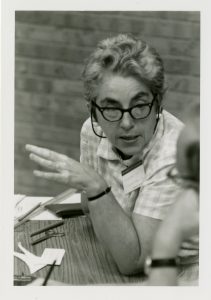Archival collections offer a unique glimpse into someone’s life that we do not get from just a biography. Sometimes the seemingly random pieces or folders offer the most complete picture of a person or organization. Katherine DeLage Taft’s connection to the Vietnam War is an example of this that I personally love.

Katherine DeLage Taft, no date
Katherine DeLage Taft graduated from Mundelein College* in 1938 with a Bachelor’s degree in Chemistry. After getting married to Andrew Taft and having five children, she returned to school and received her Master’s degree in education from Cornell University in 1961. She held many positions in science and education organizations and participated in many summer research expeditions, including several science-themed cruises.

Katherine D Taft newsletter, 1968
Her collection is generally rooted in her professional career as a high school earth science teacher at Barrington High School and Edgewood School in the Chicago suburbs, with a bulk of her finding aid describing correspondence with science organizations, scripts for educational science videos, research, and lesson plans. However, a deeper dive into her collection shows her dedication to her students beyond the science classroom and her connection to not an important scientific event, but a historical one.
In 1967 and 1968, Katherine D. Taft wrote newsletters to her graduated students who were serving in the military. Though they are filled with sometimes-mundane news, these newsletters are an interesting glimpse into what she deemed important to tell these soldiers. Possibly inspired by her own son, Michael, who was in the Marines, these newsletters gave soldiers updates on their hometown school sports and local and national news, including the assassination of Martin Luther King Jr. Every newsletter also provides updates on fellow students who are serving, containing the sobering fact that many of these soldiers had graduated only 2-3 years earlier.
The soldiers responded fondly to these newsletters, and we have several of their responses in her collection. Some of the soldiers were so into the idea of a community of Barrington High School soldiers, they even donated their patches to her.

“I am very sure that all of us in the service want to thank you from the bottom of our hearts for what you are doing with your little bulletin” “P.S. Why don’t you also start a collection of patches of the different units the troops are in. Here is one to start it off.”
Their letters reveal the students’ experiences, hopes, expectations, and opinions of being in the armed forces.

“I would like to write more but it would be about Viet Nam and when I think about this place I tend to want to forget it. Bummerland!” (October 1968)
Beyond letters between Taft and the students, her collection also includes letters from local mothers who wanted the newsletters sent to their own sons. Referencing an article in the local newspaper, these letters show that Katherine DeLage Taft’s newsletter was important to the community and not just the high school.

“Ray is a 1964 graduate of BCHS, and he appreciates all mail from home he can get. Thank you for your support in the armed forces in Viet Nam.” (October 1967)
Though it is only five folders of her science-focused collection, Taft’s letters to and from her students fighting in the Vietnam War are an invaluable piece of local history. They are a glimpse into her personal priorities and show how a teacher’s dedication to her students can reach beyond the classroom and the local community.
* Mundelein College, founded and operated by the Sisters of Charity of the Blessed Virgin Mary (BVM), provided education to women from 1930 until 1991, when it affiliated with Loyola University Chicago.
Emily is a Graduate Assistant at the WLA and is in her second year in the joint Public History/Library Information Science program with Loyola University Chicago and Dominican University. She enjoys going on long walks with her puppy, visiting cool museums, and cheering on the White Sox during baseball season.
